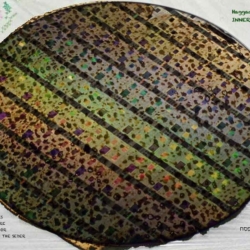A version of the Pesaḥ Haggadah with full cantillation. Also includes several additional optional passages from the editor for those who prefer a more egalitarian rite, as well as a few instructions. This text is meant to be used for reading along with a more traditional haggadah with fuller instructions and discussion prompts, rather than as a replacement.


“📄 הגדה לסדר פסח | The Passover Seder Haggadah, tropified by Isaac Gantwerk Mayer” is shared through the Open Siddur Project with a Creative Commons Attribution-ShareAlike 4.0 International copyleft license.
From a family of musicians, Isaac Gantwerk Mayer believes that creative art is one of the most powerful ways to get in touch with the divine. He composes music and poetry in Hebrew and English. (He also translates and authors his own original works.) Isaac runs a Jewish music transcription service, which will transcribe and set any Jewish music in any language, recorded or written. Contact his service on Facebook or via his music blog.
From a family of musicians, Isaac Gantwerk Mayer believes that creative art is one of the most powerful ways to get in touch with the divine. He composes music and poetry in Hebrew and English. (He also authors his own original works and transcribes Hebrew and Aramaic text, adding niqqud and t'amim as needed.) Isaac runs a Jewish music transcription service, which will transcribe and set any Jewish music in any language, recorded or written. Contact his service on Facebook or via his music blog.
Stable Link:
https://opensiddur.org/?p=24582
Associated Image:


Additional 14762; Eleazar of Worms, Haggadah for Passover (the ‘Ashkenazi Haggadah’), German rite with the commentary of Eleazar of Worms; Germany, S; c. 1460; f.6. H/T Ennius @red_loeb
(This image is set to automatically show as the "featured image" in shared links on social media.)
Re-formatted:
ODT
Terms of Use:
Be a mentsch (a conscientious, considerate person) and adhere to the following guidelines:
- Properly attribute the work to Isaac Gantwerk Mayer (transcription & naqdanut) and Isaac Gantwerk Mayer (translation).
- Clearly indicate the date you accessed the work and in what ways, if any, you modified it. (If you have adapted the work, let us know so that the contributor might consider endorsing your revision.)
- Provide the stable link to this resource: <https://opensiddur.org/?p=24582>.
- Indicate that the original work was shared under the Creative Commons Attribution-ShareAlike (CC BY-SA) 4.0 International copyleft license. (To redistribute or remix this work in any format, modified or unmodified, you must refer to the terms of the license under which the work is shared.)
Additional Notes:
- The views expressed in this work represent the views of their creator(s) and do not necessarily represent the views of the Open Siddur Project's developers, its diverse community of volunteer contributors, or its institutional partners.
- We strongly advise against printing sacred texts and art containing divine names as these copies must be regarded with reverence, complicating their casual treatment and disposal.
- If you must dispose of a printed sacred text (one containing Divine Names), please locate the closest genizah (often established by a synagogue) and contact its custodians for further instructions. We also recommend using Morah Yehudis Fishman's Prayer for Adding a Work to the Genizah.
Support this work:
The Open Siddur Project is a volunteer-driven, non-profit, non-commercial, non-denominational, non-prescriptive, gratis & libre Open Access archive of contemplative praxes, liturgical readings, and Jewish prayer literature (historic and contemporary, familiar and obscure) composed in every era, region, and language Jews have ever prayed. Our goal is to provide a platform for sharing open-source resources, tools, and content for individuals and communities crafting their own prayerbook (siddur). Through this we hope to empower personal autonomy, preserve customs, and foster creativity in religious culture.
ויהי נעם אדני אלהינו עלינו ומעשה ידינו כוננה עלינו ומעשה ידינו כוננהו "May the pleasantness of אדֹני our elo’ah be upon us; may our handiwork be established for us — our handiwork, may it be established." –Psalms 90:17









Leave a Reply